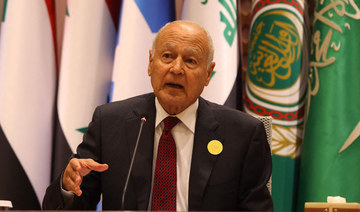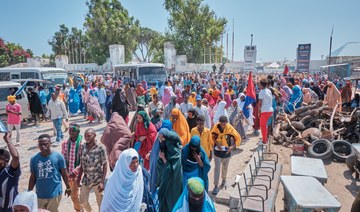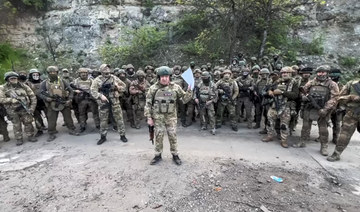KUALA LUMPUR: Less than a year after taking office, Malaysian Prime Minister Anwar Ibrahim faces a critical first test in state elections next month that pits his government against a powerful Islamic opposition.
Election Commission chief Abdul Ghani Salleh said Wednesday that over 9.7 million voters will head to the ballot box on Aug. 12 to elect 245 assemblymen for six states.
While state elections generally do not affect the federal government, it will be closely watched as a gauge of support for Anwar’s unity government that was f ormed after a divisive general election in November.
Anwar’s multiethnic Pakatan Harapan (PH) alliance won the most seats in November polls but fell short of a majority after many ethnic Malays threw their support behind the Perikatan Nasional (PN) bloc led by former Prime Minister Muhyiddin Yassin. The PN bloc includes the conservative Pan-Malaysian Islamic Party (PAS), that unexpectedly rose to become the single largest party in Parliament.
Anwar clinched the premiership after securing the backing of a once-dominant rival, a coalition led by the United Malays National Organization and other smaller parties for a majority to form a unity government. The tie-up between Anwar’s PH and the UMNO-led Barisan Nasional was once unthinkable in Malaysian politics, which has been shaped by long rivalry between the two parties.
“The state elections is the first test of popularity for the unity government on a rather nationwide scale, virtually half of Malaysia,” said Ahmad Fauzi Abdul Hamid, a political science lecturer at the University of Science, Malaysia. “It’ll test whether the people, especially PH and BN’s supporters who have long regarded each other as rivals, welcome such cooperation or not.”
The formation of Anwar’s unity government came at the behest of the country’s king, who wanted to break the deadlock over the hung Parliament and create stability after a period of political turmoil. Malaysia has had three prime ministers in the past four years before November polls as lawmakers switched allegiance for political mileage.
Anwar’s rise to the top job caps a roller-coaster political journey of more than two decades and has eased fears over greater Islamization. His main challenge has been to strengthen his appeal among ethnic Malays, many who view Anwar as too liberal and fear their Islamic identity and economic privileges under a decades-old affirmative action program may be chipped away. Malays form two-thirds of Malaysia’s 33 million people, which include large ethnic Chinese and Indian minorities.
PAS, which aims to create a theocratic state, has stepped up racial and religious rhetorics in recent months as it seeks to expand its influence and show that the unexpected wave of Malay support it won in November was more than a fortuity. Once confined to rural areas, PAS made strong gains in urban areas to win 49 out of 222 Parliamentary seats. It has also not hide its ambition of trying to topple Anwar by gaining support of government lawmakers.
The elections next month will be held in Penang, Selangor — two of the country’s richest states — and Negeri Sembilan that were controlled by Anwar’s PH alliance as well as in the rural states of Kedah, Kelantan and Terengganu ruled by PAS. Most analysts believe this would remain status quo in the polls, but some say PAS could make further dents on PH’s hold in the three states.
“If PN were to sweep five or all six state governments, the federal government will immediately become shaky, as many Malay MPs may be tempted to switch their support, thereby bringing about the downfall of the Anwar government,” said Oh Ei Sun with Singapore’s Institute of International Affairs
It may not be easy as Anwar’s government has a two-thirds majority in Parliament, the strongest ever in 15 years. Many are also wary of triggering another bout of political unrest amid a slow economic recovery.
A lot will depend on UMNO’s performance. The UMNO-led coalition ruled Malaysia since the country’s independence from Britain in 1957 until its downfall in 2018 general election amid anger over government corruption. UMNO’s president, who is now one of Anwar’s two deputies, is on trial for graft. If UMNO performs badly, analysts said it could trigger a revolt by anti-Anwar factions and lead to a rethink of their alliance.
“The polls are mainly a battle for Malay votes as both sides realize that the stability of any government in Malaysia rests on support from Malaysia’s majority community,” said analyst Ahmad Fauzi.
Malaysian PM Anwar faces crucial test of support in state polls next month
https://arab.news/yuw88
Malaysian PM Anwar faces crucial test of support in state polls next month

- Malaysian Prime Minister Anwar Ibrahim faces a critical first test in state elections next month
- The Election Commission said Wednesday that over 9.7 million voters will head to the ballot box on Aug 12 to elect assemblymen for six states
Why Venezuela’s presidential election should matter to the rest of the world

- President Nicolas Maduro is being challenged by former diplomat Edmundo González Urrutia, who represents the resurgent opposition, and eight other candidates
- Maduro’s popularity has dwindled due to an economic crisis caused by a drop in oil prices, corruption and government mismanagement
CARACAS, Venezuela: The future of Venezuela is on the line. Voters will decide Sunday whether to reelect President Nicolas Maduro, whose 11 years in office have been beset by crisis, or allow the opposition a chance to deliver on a promise to undo the ruling party’s policies that caused economic collapse and forced millions to emigrate.
Historically fractured opposition parties have coalesced behind a single candidate, giving the United Socialist Party of Venezuela its most serious electoral challenge in a presidential election in decades.
Maduro is being challenged by former diplomat Edmundo González Urrutia, who represents the resurgent opposition, and eight other candidates. Supporters of Maduro and Gonzalez marked the end of the official campaign season Thursday with massive demonstrations in the capital, Caracas.

Here are some reasons why the election matters to the world:
Migration impact
The election will impact migration flows regardless of the winner.
The instability in Venezuela for the past decade has pushed more than 7.7 million people to migrate, which the UN’s refugee agency describes as the largest exodus in Latin America’s recent history. Most Venezuelan migrants have settled in Latin America and the Caribbean, but they are increasingly setting their sights on the US.
A nationwide poll conducted in April by the Venezuela-based research firm Delphos indicated that about a quarter of the people in Venezuela were thinking about emigrating if Maduro wins again. Of those, about 47 percent said a win by the opposition would make them stay, but roughly the same amount indicated that an improved economy would keep them in their home country. The poll had a margin of error of plus or minus 2 percentage points.
The main opposition leader is not on the ballot
The most talked-about name in the race is not on the ballot: María Corina Machado. The former lawmaker emerged as an opposition star in 2023, filling the void left when a previous generation of opposition leaders fled into exile. Her principled attacks on government corruption and mismanagement rallied millions of Venezuelans to vote for her in the opposition’s October primary.

But Maduro’s government declared the primary illegal and opened criminal investigations against some of its organizers. Since then, it has issued warrants for several of Machado’s supporters and arrested some members of her staff, and the country’s top court affirmed a decision to keep her off the ballot.
Yet, she kept on campaigning, holding rallies nationwide and turning the ban on her candidacy into a symbol of the loss of rights and humiliations that many voters have felt for over a decade.
She has thrown her support behind Edmundo González Urrutia, a former ambassador who has never held public office, helping a fractious opposition unify.
They are campaigning together on the promise of economic reform that will lure back the millions of people who have migrated since Maduro became president in 2013.
González began his diplomatic career as an aide to Venezuela’s ambassador in the US in the late 1970s. He was posted to Belgium and El Salvador, and served as Caracas’ ambassador to Algeria. His last post was as ambassador to Argentina during Hugo Chávez’s presidency, which began in 1999.
Why is the current president struggling?
Maduro’s popularity has dwindled due to an economic crisis caused by a drop in oil prices, corruption and government mismanagement.
Maduro can still bank on a cadre of die-hard believers, known as Chavistas, including millions of public employees and others whose businesses or employment depend on the state. But the ability of his party to use access to social programs to make people vote has diminished as the economy has frayed.
He is the heir to Hugo Chávez, a popular socialist who expanded Venezuela’s welfare state while locking horns with the United States.
Sick with cancer, Chávez handpicked Maduro to act as interim president upon his death. He took on the role in March 2013, and the following month, he narrowly won the presidential election triggered by his mentor’s death.
Maduro was reelected in 2018, in a contest that was widely considered a sham. His government banned Venezuela’s most popular opposition parties and politicians from participating and, lacking a level playing field, the opposition urged voters to boycott the election.
That authoritarian tilt was part of the rationale the US used to impose economic sanctions that crippled the country’s crucial oil industry.
Mismanaged oil industry
Venezuela has the world’s largest proven crude reserves, but its production declined over several years, in part because of government mismanagement and widespread corruption in the state-owned oil company.
In April, Venezuela’s government announced the arrest of Tareck El Aissami, the once-powerful oil minister and a Maduro ally, over an alleged scheme through which hundreds of millions of dollars in oil proceeds seemingly disappeared.
That same month, the US government reimposed sanctions on Venezuela’s energy sector, after Maduro and his allies used the ruling party’s total control over Venezuela’s institutions to undermine an agreement to allow free elections. Among those actions, they blocked Machado from registering as a presidential candidate and arrested and persecuted members of her team.
The sanctions make it illegal for US companies to do business with state-run Petróleos de Venezuela S.A., better known as PDVSA, without prior authorization from the US Treasury Department. The outcome of the election could decide whether those sanctions remain in place.
An uneven playing field
A more free and fair presidential election seemed like a possibility last year, when Maduro’s government agreed to work with the US-backed Unitary Platform coalition to improve electoral conditions in October 2023. An accord on election conditions earned Maduro’s government broad relief from the US economic sanctions on its state-run oil, gas and mining sectors.
But days later, authorities branded the opposition’s primary illegal and began issuing warrants and arresting human rights defenders, journalists and opposition members.
A UN-backed panel investigating human rights violations in Venezuela has reported that the government has increased repression of critics and opponents ahead of the election, subjecting targets to detention, surveillance, threats, defamatory campaigns and arbitrary criminal proceedings.
The government has also used its control of media outlets, the country’s fuel supply, electric network and other infrastructure to limit the reach of the Machado-González campaign.
The mounting actions taken against the opposition prompted the Biden administration earlier this year to end the sanctions relief it granted in October.
FBI says Trump was indeed struck by bullet during assassination attempt

- Earlier in the week, FBI Director Christopher Wray appeared to cast doubt on whether Trump had actually been hit by a bullet
- FBI’s reluctance to immediately vouch for Trump’s version of events has been blasted by the Republican nominee and his supporters
WASHINGTON: Nearly two weeks after Donald Trump’s near assassination, the FBI confirmed Friday that it was indeed a bullet that struck the former president’s ear, moving to clear up conflicting accounts about what caused the former president’s injuries after a gunman opened fire at a Pennsylvania rally.
“What struck former President Trump in the ear was a bullet, whether whole or fragmented into smaller pieces, fired from the deceased subject’s rifle,” the agency said in a statement.
The statement from the FBI marked the most definitive law enforcement account of Trump’s injuries and followed ambiguous comments earlier in the week from Director Christopher Wray that appeared to cast doubt on whether Trump had actually been hit by a bullet.
The comment drew fury from Trump and his allies and further stoked conspiracy theories that have flourished on both sides of the political aisle amid a dearth of information following the July 13 attack.
Up until now, federal law enforcement agents involved in the investigation, including the FBI and Secret Service, had repeatedly refused to provide information about what caused Trump’s injuries. Trump’s campaign has also declined to release medical records from the hospital where he was first treated or to make the doctors there available for questions.
Updates have instead come either from Trump himself or from Trump’s former White House doctor, Ronny Jackson, a staunch ally who who now represents Texas in Congress. Though Jackson has been treating Trump since the night of the attack, he has come under considerable scrutiny and is not Trump’s primary care physician.
The FBI’s apparent reluctance to immediately vouch for the former president’s version of events — along with the ire he and some supporters have directed at the bureau in the shooting’s aftermath — has also raised fresh tension between the Republican nominee and the nation’s premier federal law enforcement agency, which he could soon exert control over once again.
Trump and his supporters have repeatedly accused federal law enforcement of being weaponized against him.
Questions about the extent and nature of Trump’s wound began immediately after the attack, as his campaign and law enforcement officials declined to answer questions about his condition or the treatment he received after Trump narrowly escaped death in an attempted assassination by a gunman with a high-powered rifle.
Those questions have persisted despite photos showing the trace of a projectile speeding past Trump’s head, photographs that show Trump’s teleprompter glass intact after the shooting, and the account Trump himself gave in a Truth Social post within hours of the shooting saying he had been “shot with a bullet that pierced the upper part of my right ear.”
“I knew immediately that something was wrong in that I heard a whizzing sound, shots, and immediately felt the bullet ripping through the skin,” he wrote.
Days later, in a speech accepting the nomination at the Republican National Convention in Milwaukee, Trump described the horrific scene in detail, while wearing a large, white, gauze bandage over his right ear.
“I heard a loud whizzing sound and felt something hit me really, really hard, on my right ear. I said to myself, ‘Wow, what was that? It can only be a bullet,’” he said.
“If I had not moved my head at that very last instant,” Trump said, “the assassin’s bullet would have perfectly hit its mark, and I would not be here tonight.”
But the first medical account of Trump’s condition didn’t come until a full week after the shooting, when Jackson released his first letter last Saturday evening. In that letter, he said the bullet that struck Trump had “produced a 2 cm wide wound that extended down to the cartilaginous surface of the ear.” He also revealed that Trump had received a CT scan at the hospital.
But federal law enforcement involved in the investigation, including the FBI and Secret Service, had declined to confirm that account. And Wray’s testimony offered apparently conflicting answers on the issue.
“There’s some question about whether or not it’s a bullet or shrapnel that hit his ear,” Wray testified, before he seemed to suggest it was indeed a bullet.
“I don’t know whether that bullet, in addition to causing the grazing, could have also landed somewhere else,” he said.
The following day, the FBI sought to clarify matters with a statement affirming that the shooting was an “attempted assassination of former President Trump which resulted in his injury, as well as the death of a heroic father and the injuries of several other victims.” The FBI also said Thursday that its Shooting Reconstruction Team continues to examine bullet fragments and other evidence from the scene.
Jackson, who has been treating the former president since the night of the July 13 shooting, told The Associated Press on Thursday that any suggestion Trump’s ear was bloodied by anything other than a bullet was reckless.
“It was a bullet wound,” said Jackson. “You can’t make statements like that. It leads to all these conspiracy theories.”
In his letter Friday, Jackson insisted “there is absolutely no evidence” Trump was struck by anything other than a bullet and said it was “wrong and inappropriate to suggest anything else.”
He wrote that at Butler Memorial Hospital, where the GOP nominee was rushed after the shooting, he was evaluated and treated for a “Gunshot Wound to the Right Ear.”
“Having served as an Emergency Medicine physician for over 20 years in the United States Navy, including as a combat physician on the battlefield in Iraq,” he wrote, “I have treated many gunshot wounds in my career. Based on my direct observations of the injury, my relevant clinical background, and my significant experience evaluating and treating patients with similar wounds, I completely concur with the initial assessment and treatment provided by the doctors at nurses at Butler Memorial Hospital on the day of the shooting.”
The FBI declined to comment on the Jackson letters.
Asked if the campaign would release those hospital records, or allow the doctors who treated him there to speak, Trump campaign spokesperson Steven Cheung blasted the media for asking.
“The media has no shame in engaging in disgusting conspiracy theories,” he said. “The facts are the facts, and to question an abhorrent assassination attempt that ultimately cost a life and injured two others is beyond the pale.”
In emails last week, he told the AP that “medical readouts” had already been provided.
“It’s sad some people still don’t believe a shooting happened,” Cheung said, “even after one person was killed and others were injured.”
Anyone who believes the conspiracies, he added, “is either mentally deficient or willfully peddling falsehoods for political reasons.”
Sen. Lindsey Graham, R-S.C., a close Trump ally, also urged Wray to correct his testimony in a letter Friday to the FBI director, saying the fact Trump had been hit by a bullet “was made clear in briefings my office received and should not be a point of contention.”
“As head of the FBI, you should not be creating confusion about such matters, as it further undercuts the agency’s credibility with millions of Americans,” he wrote.
Trump also lashed out at Wray in a post on his Truth Social network, saying it was “No wonder the once storied FBI has lost the confidence of America!”
“No, it was, unfortunately, a bullet that hit my ear, and hit it hard. There was no glass, there was no shrapnel,” he wrote.
On Friday, he called Wray’s comments “so damaging to the Great People that work in the FBI.”
Jackson has faced significant scrutiny over the years.
After administering a physical to Trump in 2018, he drew headlines for suggesting that “if he had a healthier diet over the last 20 years, he might live to be 200 years old.”
He was reportedly demoted by the Navy after the Department of Defense inspector general released a scathing report on his conduct as a top White House physician that found Jackson had made “sexual and denigrating” comments about a female subordinates and took prescription-strength sleeping medication that prompted worries from his colleagues about his ability to provide proper medical care.
Trump appointed Wray in 2017 to replace the fired James Comey as director of the FBI. But the then-president swiftly soured on his hire as the bureau continued its investigation into the Russian election interference.
Trump flirted openly with the idea of firing Wray as his term drew to a close, and he lashed out anew after the FBI executed a search warrant at his Mar-a-Lago estate in Florida to recover boxes of classified documents from his presidency.
G20 financial chiefs flag global economic ‘soft landing’, warn of risks from war

- Communique avoids mention of wars in Gaza and Ukraine, to sidestep disagreements between Russia and major Western nations
- Communique avoids mention of wars in Gaza and Ukraine, to sidestep disagreements between Russia and major Western nations
RIO DE JANEIRO: G20 financial leaders said on Friday the global economy was likely heading for a “soft landing,” but warned wars and escalating conflicts could endanger this outlook, while more global cooperation could make growth stronger.
In a joint communique after a two-day meeting in Brazil, finance ministers and central bankers from the Group of 20 major economies also committed to resist protectionism in trade and stressed the need to reduce economic inequalities.
Last month, the World Bank forecast that the global economy would avoid a third consecutive decline in growth since a major post-pandemic jump in 2021, with 2024 growth stabilising at 2.6 percent, in line with 2023, but warned that overall output would remain well below pre-pandemic levels through 2026.
“We are encouraged by the increasing likelihood of a soft landing of the global economy, although multiple challenges remain,” the communique said. “Downside risks include wars and escalating conflicts,” it said.
By avoiding explicit mention of the conflicts in Ukraine and Gaza, diplomats have worked to sidestep the disagreements between Russia and major Western nations that derailed a consensus at the finance chiefs’ gathering in February.
To defuse the disagreement, Brazil drafted a chair statement on geopolitical issues, stressing that these matters will be addressed by G20 leaders in November.
“The G20 made a wise decision to put geopolitical issues in their place to allow the cooperation agenda to move forward,” Brazil Finance Minister Fernando Haddad told a news conference.
Haddad also hailed the group’s first-ever declaration calling for cooperation to effectively tax the world’s largest fortunes, although that separate joint statement papered over disagreements about the right forum to advance the agenda.
The G20 communique said economic activity had proved to be more resilient than expected in many parts of the world, but the recovery had been highly uneven across countries, contributing to the risk of economic divergence.
Balance of risks
The document flagged risks to the economic outlook that remain broadly balanced, with more economic cooperation, faster-than-expected disinflation and technological innovations, like the safe development of Artificial Intelligence (AI), cited among upside risks.
But at the same AI tech could also turn out to be a downside risk to growth, the document said, along with economic fragmentation and persistent inflation keeping interest rates higher for longer, extreme weather events, and excessive debt.
Climate change and significant loss of biodiversity were key topics of concern, the G20 financial leaders agreed, warning that if poorer nations had to shoulder more of the cost of fighting climate change, it would make global inequality worse.
“We reiterate the understanding that the cost of inaction is greater than the cost of action,” the communique said.
The document also stepped-up language calling for a reform of the International Monetary Fund, that would give emerging and developing economies a bigger say in the lender of last resort.
The G20 communique underlined the “urgency and importance of realignment in quota shares to better reflect members’ relative positions in the world economy.” G20
UK foreign secretary urged to listen to support for recognition of Somaliland

- David Lammy pressed by former defense secretary Gavin Williamson
- Appeal comes after Liverpool calls on government to recognize East African state
LONDON: Britain’s former defense secretary Sir Gavin Williamson has urged Foreign Secretary David Lammy to listen to calls for the UK to recognize Somaliland as a sovereign nation, The Independent reported on Friday.
“This is an important symbolic step and I hope the foreign secretary listens to the growing cross-party voices on this matter and acts to move UK policy to recognize Somaliland, so recognizing the reality on the ground,” he said.
Lammy is being pushed to review UK foreign policy toward a potential key ally in the Red Sea conflict with the Iran-backed Houthis. The former British colony is not officially recognized by any international power despite functioning as an independent state since 1991 when it broke away from Somalia following a civil war.
Earlier this week, the Lord Mayor of Liverpool Richard Kemp said: “Liverpool council unanimously agreed a motion calling upon HMG (His Majesty’s Government) to recognize the former British Protectorate of Somaliland as an independent country free from Somalia. The Somaliland representative to the UK and local Somaliland residents were delighted.”
The Somaliland Diaspora Office wrote on X: “We deeply appreciate Liverpool City Council’s July 24, 2024 motion re-recognizing Somaliland’s independence. This milestone is a testament to the tireless efforts of the Somaliland community in Liverpool, the UK Mission, and advocates worldwide. We congratulate all involved!”
Williamson praised Liverpool’s decision and urged Lammy to take note.
Since the UK and US were forced to intervene against Houthi terrorists from Yemen in the Gulf of Aden — one of the world’s key shipping routes — pressure has increased to rethink recognition of Somaliland. Its port of Berbera has been described as a potential base for UK and US military operations.
Ethiopia last year became the first African country to agree any form of recognition with Somaliland with a deal that gave it access to the sea. The move infuriated Somalia which claims Somaliland as part of its territory and led to mass protests.
Belgium charges three Chechens on suspicion of ‘terrorism’

- They are suspected of involvement with the Daesh group’s Khorasan offshoot in central Asia
- Seven people, all of Chechen origin, were detained on Thursday
BRUSSELS: A Belgian judge on Friday charged three Chechens on suspicion of terrorism offenses, the federal prosecutor’s office said, a day after police launched country-wide raids over fears of an attack in preparation.
They are suspected of involvement with the Daesh group’s Khorasan offshoot in central Asia. Seven people, all of Chechen origin, were detained on Thursday.
Six suspects appeared before a judge on Friday, who ordered three kept in custody, charging them with offenses including “preparing a terrorist attack.”
One suspect was also charged with financing terrorism, the prosecutor’s office said.
The other three were released but the seventh suspect did not appear before the judge.
But the prosecutor’s office said in a statement that at this stage, there was no “concrete” information about “a specific purpose.”
Thursday’s police raids across Belgium were carried out in Brussels, Antwerp, Liege, Courtrai and Menin, under warrants issued by the Antwerp-based judge.
An official told AFP on Thursday there was no evidence of any link to the 2024 Paris Olympics, whose opening ceremony takes place on Friday under unprecedented security.
Belgian media reported the arrests came as a precautionary measure ahead of the Games.
The same sources said the action was taken in coordination with authorities in Germany, where there were raids and two arrests of individuals linked to the same Daesh group.
Belgium in 2016 was rocked by suicide bomb attacks at its airport and in its metro system that killed 32 people and wounded hundreds.
The attacks were claimed by the Daesh group.
In October last year, a gunman who said on social media he was inspired by the Daesh group shot dead two Swedish football fans in Brussels.


















